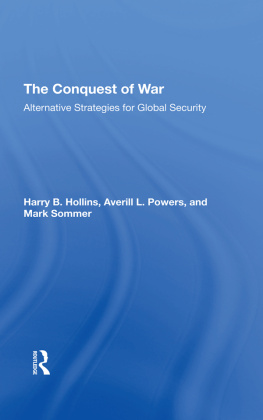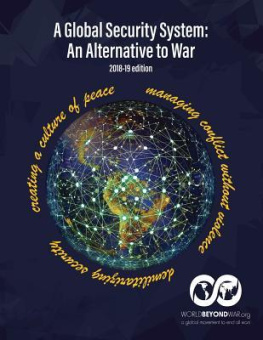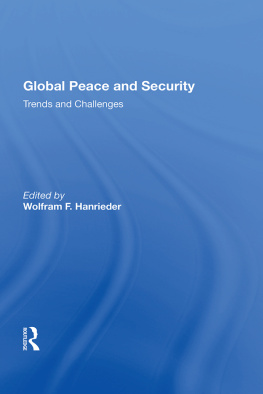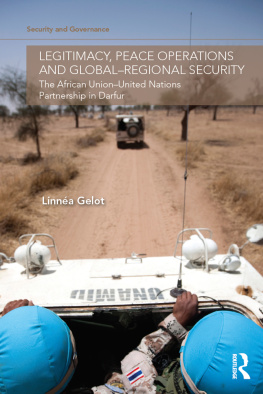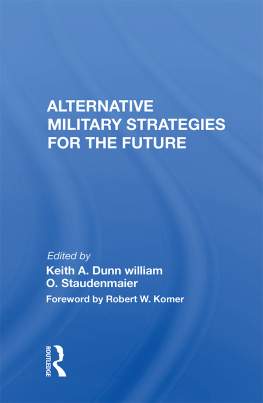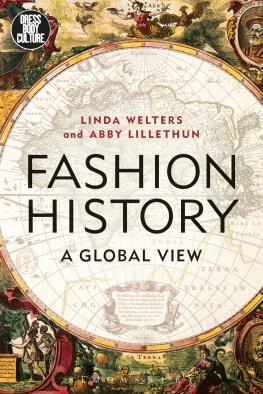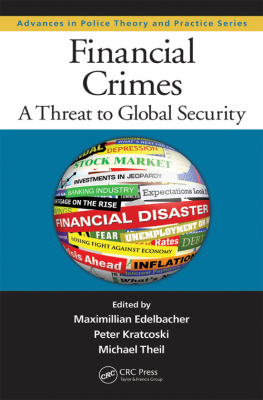T HE C ONQUEST OF W AR
Sponsored by
The Alternative Defense Project
Chairman: Harry B. Hollins
Former Director: Averill L. Powers
Editor and Research Director: Mark Sommer
Director: James F. Tierney
Board of Advisors
Randall Forsberg, Executive Director, Institute for Defense and Disarmament Studies
Rev. Theodore M. Hesburgh, Former President, University of Notre Dame
James W. Rouse, Founder, Rouse Company; President, Enterprise Foundation
Thomas Winship, Former Editor, Boston Globe
Daniel Yankelovich, President, Public Agenda; Chairman, Daniel Yankelovich Group, Inc.
Managing Committee
Elizabeth Crow, President, Gruner and Jahr Publishing
William L. Dunfey, Director, Omni-Dunfey Hotels
Harry B. Hollins, Chairman, Alternative Defense Project
Betty G. Lall, Senior Fellow, Council on Economic Priorities
Averill L. Powers, New York University Law School
James F. Tierney, Director, The Alternative Defense Project
Ira D. Wallach, Chairman, Central National-Gottesman, Inc.
First published 1988 by Westview Press
Published 2019 by Routledge
52 Vanderbilt Avenue, New York, NY 10017
2 Park Square, Milton Park, Abingdon, Oxon OX14 4RN
Routledge is an imprint of the Taylor & Francis Group, an informa business
Copyright 1988 Taylor & Francis
All rights reserved. No part of this book may be reprinted or reproduced or utilised in any form or by any electronic, mechanical, or other means, now known or hereafter invented, including photocopying and recording, or in any information storage or retrieval system, without permission in writing from the publishers.
Notice:
Product or corporate names may be trademarks or registered trademarks, and are used only for identification and explanation without intent to infringe.
Library of Congress Cataloging-in-Publication Data
Hollins, Harry B.
The conquest of war : alternative strategies for global security /
Harry B. Hollins, Averill L. Powers, and Mark. Sommer
p. cm.
Bibliography: p.
Includes index.
1. Security, International. 2. Deterrence (Strategy). 3. Nuclear
disarmament. I. Powers, Averill L. II. Sommer, Mark.
III. Title.
JX1952.H69 1989
327.17dc19
88-28216
CIP
ISBN 13: 978-0-367-29101-3 (hbk)
Contents
, Kenneth Boulding
PART ONE
THE UNITED NATIONS AND SIX ALTERNATIVE APPROACHES TO GLOBAL SECURITY
PART TWO
KEEPING THE PEACE: ISSUES COMMON TO ALL APPROACHES
,
Roger Fisher
PART THREE
PROSPECTS FOR TRANSFORMATION
This book is the product of a collaboration between three generations. Harry Hollins, the elder among us, has been instrumental in projects to study and promote thinking about global security alternatives for more than forty years, first in his work with the World Federalists, later in founding the World Law Fund (now the World Policy Institute). Mark Sommer, representing the middle generation, has spent the past decade surveying and stimulating the development in North America and Europe of new approaches to global security and national defense. Averill Powers, the youngest among us, worked at the World Policy Institute and as an independent consultant before cofounding the Alternative Defense Project (ADP) with Harry in late 1985. Averill was the first director of ADP and is now at the New York University School of Law.
Collaboration is a difficult proposition in the best of cases, and with each additional contributor the complications multiply. So it is with great satisfaction that we complete our collective enterprise still better friends than when we began.
We gratefully acknowledge the scholarly assistance of Michael Closson, Lloyd Jeffry Dumas, Dietrich Fischer, Roger Fisher, Richard Garwin, Frank von Hippel, Robert Irwin, Saul H. Mendlovitz, Betty Reardon, and Louis B. Sohn, whose comments and suggestions greatly strengthened the manuscript. We also wish to acknowledge the valued secretarial services of Carol Main and Catherine Selling Moore, whose patience was often tested by frequent retypings of chapters, and of Terri Clemens and Michael Coar.
We would like to thank all those who have given financial support to this undertaking and especially the John Merck Fund, the Miriam and Ira D. Wallach Foundation, and Joan Warburg. It is thanks only to the faith and trust of those few who recognize the value of such ideas as are contained in this book that they are given expression and a life in the world.
Finally, we wish to extend our personal thanks to Elizabeth Hollins and Sandi Sommer, wives of two of the coauthors. Elizabeth#_#x2019_#s close reading of the manuscript and insightful suggestions for improvement greatly enhanced its readability. And Sandi graciously accepted more than her share of the tasks on a many-dimensional farm in order to free the time for her partner to work on the book.
To all these valued colleagues and friends, we offer our sincerest thanks.
Harry B. Hollins
Averill L. Powers
Mark Sommer
This is a book of many valuable uses. It draws together succinctly and in very clear language the ideas, the problems, the issues, and the organizations that participate in a worldwide movement at many different levels to diminish the probability of war and ultimately to abolish it. The book is well named The Conquest of War , for all the great variety of movements, institutions, and processes that it describes have one thing in commonthey see war as an enemy of the human race, which, if not conquered, will destroy us. Up to now, war has been a recurrent, but manageable disease, which has created great misery and distress, death and suffering, but which has not stopped (although it may have hindered) the evolution of the human race toward the realization of its extraordinary genetic potential for knowledge and for the good life. With the advent of the nuclear weapon, however, and the long-range missile, and the very real possibility in the future of what Herman Kahn called the doomsday machine, war has become a deep threat not only to the continued evolution and development of the human race, but to the whole evolution of life on this planet. The human race has had an extraordinary capacity for increasing its powers of production, but along with this has gone an increase in its powers of destruction. The great question for the future is whether the powers of destruction are going to overcome the powers of production and lead perhaps eventually to a lifeless and desolated planet. The conquest of war, therefore, has become the highest priority of the human race.
This book is a remarkable survey of what might be called the battleground, the conscious processes by which the conquest of war may be achieved. It covers such subjects as national security policy, which the book shows convincingly cannot really give us security in the modern world; proposals such as the Clark and Sohn proposal for a world political organization; analysis of deterrence; problems of disarmament, especially qualitative disarmament; nonprovocative defense; civilian-based defense; verification; international law; economic conversion; a common security system; and so on. The book will be useful as a reference book to those who are working in the field and as a general introduction to the field for the general reader, for it is very well written and explains many technical details in language that the concerned but unspecialized reader can understand. It will also be extremely useful as a textbook in courses in the burgeoning field of peace and conflict studies.

